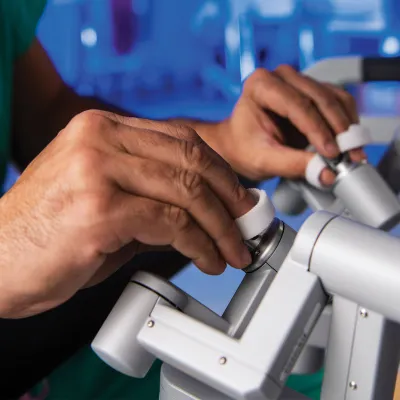
Providing a Better Quality of Life After Colorectal Cancer Surgery
The colon and rectal surgeons at the AdventHealth Digestive Health Institute treat colon and rectal cancer with the least invasive surgical procedures possible. They strive to use surgeries that will give patients as much normal function as possible after cancer treatment.
Colorectal cancer is usually caused by one or more polyps that turn into cancer. Not all polyps on the colon or rectum will turn into cancer. However, more than 19 out of 20 of the ones that do are adenocarcinomas, the same type of glandular cancer tumor commonly found in the rest of the digestive tract. Colorectal cancer is the most common cancer that affects both men and women, and it is the second largest cause of cancer-related death. Risk factors for colorectal cancer include being age 50 or older, having a family history of colorectal cancer, having inflammatory bowel disease, being obese and having a sedentary lifestyle.
Whole-Person Care for Colon and Rectal Cancers
Most colon and rectal cancers are slow-growing and do not cause symptoms until they are more advanced.
Colorectal cancer symptoms are similar to those of other digestive cancers and conditions and can include:
- Abdominal cramping
- Blood in the stool
- Constipation
- Diarrhea
- Fatigue
- Nausea and vomiting
- Unintended weight loss
If your doctor suspects you could have colorectal cancer, you will likely have the following tests:
- Blood testing
- Imaging studies that may include an ultrasound, a CT scan or an MRI scan
- A diagnostic colonoscopy if the above tests indicate that you have a colon tumor. During the diagnostic colonoscopy, tissue samples will be collected for a biopsy. If there are any polyps present, they will be removed during the colonoscopy.
- A pathologist will study the sampled cells with a microscope to determine if they are cancer.
- A shorter scope called a proctoscope will be used if rectal cancer is suspected. The doctor will look at the tumor and determine its location.
- Other imaging tests will be done if the presence of colon or rectal cancer has been confirmed. These imaging tests will allow doctors to see if the cancer has spread, or metastasized.
- Cancer staging. Like most cancers, colorectal cancer is given a stage from 1 to 4. The earliest, stage 1, is when the cancer has not yet spread beyond the wall of the colon or rectum. The latest, stage 4, is when it has spread to distant organs.
Depending on your stage of colon or rectal cancer, surgical treatments may include anything from removing a precancerous polyp with a colonoscope to removing a portion of the colon or rectum to removing the entire colon, rectum and anus and nearby organs.
Sometimes if a tumor is blocking the colon, a procedure to redirect the intestines such as an ostomy will also be necessary. This procedure can often be reversed once the tumor is removed. Many colorectal surgeries require a permanent ostomy. However, the experienced colon and rectal surgeons at Digestive Health Institute offer sphincter-preserving surgery.
As often as possible, Digestive Health Institute's colon and rectal surgeons perform minimally invasive surgery for certain colorectal cancers. Laparoscopic surgery involves special instruments that allow a colorectal surgeon to perform some operations through three to five very small incisions the size of keyholes. Some colorectal surgeries are performed with the assistance of a robotic surgical system that allows them to be minimally invasive procedures.
While minimally invasive colorectal surgery is not right for every patient, some patients can benefit from it. These benefits include less pain, less time spent in the hospital, a faster recovery and a decreased chance for complications after the surgery compared to a traditional open procedure. These benefits can sometimes allow patients to begin their next stage of cancer treatment sooner.
The following procedures are used to treat colorectal cancers. In the right situations, the Digestive Health Institute colorectal surgeons can offer them minimally invasively:
- Colectomy (Colon Resection) – A colectomy involves removing part of all of the colon as well as nearby lymph nodes. Usually only the part of the colon affected by cancer is removed, which can be about one-third of the colon. However, if the rest of the colon has many polyps or is affected by another condition such as inflammatory bowel disease, then it might be completely removed. Having a minimally invasive colectomy from a Digestive Health Institute surgeon experienced in this approach can shorten recovery time.
- Proctectomy (Rectal Resection) – If you have rectal cancer, then surgery to remove some or all of the rectum will often be needed. This is called a proctectomy or rectal resection. The rectum consists of the last six inches of the large intestine between the colon and the anus. Depending on the exact location, size of the tumor and how deeply is has spread into the intestinal wall, minimally invasive proctectomy may be done laparoscopically or as a transanal endoscopic microsurgery. This latter procedure does not involve any external scars. Instead, a very thin endoscope and other surgical tools can be inserted through the body’s natural opening at the anus.
- Proctocolectomy (Colorectal Resection) – In some cases, patients will need the colon, rectum and anus removed to best treat cancer, a procedure called proctocolectomy. Before proceeding with this approach, Digestive Health Institute colorectal surgeons will explore other options that may preserve the rectum and anus. This procedure is followed by either J-pouch surgery or an ileostomy so the body has a new way to store and release solid waste. A proctocolectomy is a very complex surgery. While our surgeons have experience performing it minimally invasively, it may sometimes require an open procedure.
- Abdominoperineal Resection for Rectal Cancer – An abdominoperineal resection involves removing the anus, rectum and part of the sigmoid colon to stop or reduce the spread of rectal cancer. Nearby lymph nodes may also be removed. Even though it is an extensive procedure, the Digestive Health Institute surgeons are experienced in performing it as a minimally invasive procedure, either as laparoscopic or robotic-assisted surgery. Abdominoperineal resection requires a colostomy, in which the bottom of the intestine is connected to an opening in the abdomen so waste can exit the body. Having a permanent colostomy will understandably change a patient’s lifestyle. Therefore, Digestive Health Institute surgeons first consider sphincter-sparing surgery alternatives for patients with rectal cancer who have been referred for an abdominoperineal resection.
- Pelvic Exenteration – In rare cases, colorectal cancer requires the removal of nearby organs in a procedure called a pelvic exenteration. The surgeon might need to remove the bladder and/or prostate or uterus if these organs are affected by colorectal cancer.
Surgical Cancer Care
-
Anal Cancer
Our colon and rectal surgeons can help diagnose and treat anal cancer. We offer anal cancer surgery when necessary.
-
Colon and Rectal Cancer
Our experienced gastroenterologists can diagnose and treat colon and rectal cancer. Learn more about treatment and surgery options.
-
Duodenal/Small Bowel Cancer
Our gastroenterologists diagnose and treat small bowel and duodenal cancer. We offer three minimally invasive treatment options.
-
Esophageal Cancer
Typically esophageal cancer requires surgery in addition to radiation and chemotherapy. Learn more about the surgical treatments our specialists can provide.
-
Gallbladder Cancer
Removing the gallbladder with cancer is a very complex surgery that requires highly experienced surgeons like those at AdventHealth Digestive Health Institute.
-
Gastric/Stomach Cancer
We help diagnose and treat stomach cancer. We even have minimally invasive options. Learn more about how our gastroenterologists can help you.
-
Liver Cancer
Our AdventHealth Digestive Health Institute surgeons offer surgical and non-surgical liver cancer treatments, depending on your specific case. Schedule an appointment with one of our gastroenterologists.
-
Pancreatic Cancer
Our surgeons are among the region’s most experienced in pancreatic surgery. We can help treat your cancer with minimally invasive options. Learn more today.
-
Public Reporting of Outcomes
Our compassionate medical staff is committed to providing high-quality healthcare services in Hillsborough County.
Amazing Success Story
There is no more information provided for this item
After a colon test led to a diagnosis of stage 4 colon cancer, William turned to the experts at AdventHealth Digestive Health Institute for an innovative surgical procedure in which his colon and parts of his liver were resected in the same operation. Watch his story.

Recover Faster With Minimally Invasive and Robotic Surgery
The expert surgeons at the AdventHealth Digestive Health Institute have a large depth of experience in offering minimally invasive surgery.

Meet Your Dedicated Experts
Our specialists are passionate about providing collaborative care that addresses your unique needs and goals while ensuring you feel informed and supported every step of the way. Learn more about our team and their areas of expertise.

Surgical Consultations For Digestive Cancer Without the Wait
Appointments Within Seven Days for Patients with Cancer
At AdventHealth Digestive Health Institute, we know that after being diagnosed with cancer, patients want and often need to begin treatment quickly. So we make it a priority to offer appointments for cancer surgery consultations within five business days, and often earlier.
Patients who are newly diagnosed with cancer, or have just found out they have cancer again, qualify for this priority access. Our surgeons will make themselves available to see you right away, even for a second opinion. We want to help you start your treatment as soon as possible.
Let Us Help You Feel Whole Again
Whether you’re experiencing new symptoms or want a second opinion on a diagnosis, our dedicated digestive health experts are here to help you find answers and a path forward. Request an appointment today to take charge of your health and get the personal support you need.

